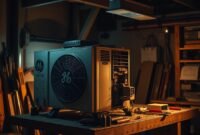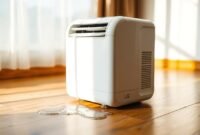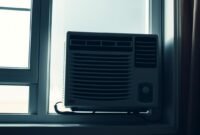Ever wondered why your air conditioner sounds like a jet engine ready for takeoff? That startling ac noise can be more than just an annoyance. It’s often a warning sign of cooling system problems. When your air conditioner sounds like a jet engine, it’s time to pay attention.
Most homeowners expect a gentle hum from their cooling system. But some hear a roaring sound that could wake the entire neighborhood. This unexpected jet engine sound might indicate anything from minor maintenance needs to serious mechanical issues that require immediate professional intervention.
Read also: Air Conditioner Whistling Noise
In this guide, I’ll break down why your AC might be mimicking an aircraft. I’ll also explain what steps you can take to restore peace and quiet to your home’s cooling system.
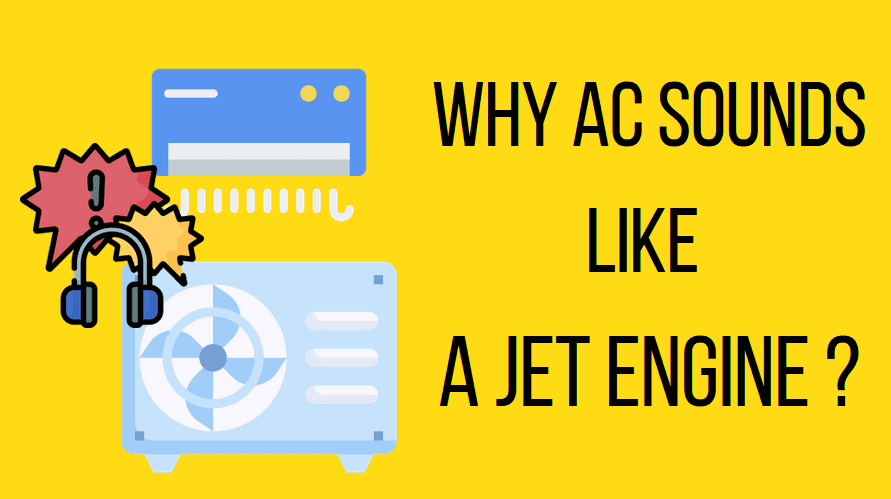
Understanding Normal vs Abnormal AC Sounds
Not all air conditioner noises are a reason to worry. Knowing the difference between normal and abnormal sounds can save you stress and money. Your heat pump and air conditioning system will make some noise when they work.
Common Acceptable AC Noises
Some sounds are perfectly normal for your air conditioning system. These include:
- Gentle humming during operation
- Soft clicking when the system starts or stops
- Moderate whooshing of air through vents
- Low-level buzzing from electrical components
When to Be Concerned About AC Sounds
Certain noises signal problems with air conditioner noise reduction. A high-pitched squeal might indicate serious issues that require immediate attention. Watch out for these warning sounds:
- Loud grinding or scraping noises
- Persistent banging or clanking
- Extremely loud operational sounds
- Unexpected high-pitched squeals
Impact of Unusual Noises on AC Performance
Unusual sounds can dramatically affect your air conditioning system’s efficiency. Ignoring these noises might lead to:
| Noise Type | Potential Performance Impact |
|---|---|
| Grinding Noise | Reduced cooling efficiency |
| High-Pitched Squeal | Potential motor or fan damage |
| Constant Loud Buzzing | Increased energy consumption |
| Banging Sounds | Risk of complete system failure |
I recommend paying close attention to your air conditioner’s sounds. While some noise is normal, persistent unusual sounds should prompt a professional inspection to prevent system damage.
What Makes Your Air Conditioner Sound Like a Jet Engine
When your air conditioner sounds like a jet engine, it’s a big warning. It means something is very wrong. You might need to fix it before it fails completely.
Several key parts can cause these loud noises during AC troubleshooting:
- Faulty condenser fan motor
- Struggling compressor system
- Frozen evaporator coils
- Damaged internal components
Each problem can stop your cooling system from working. The condenser fan, which cools your AC, makes loud noises when it fails. Unbalanced blades or worn-out bearings can sound like a high-pitched scream.
Read also: Possible Causes of Air Conditioner Knocking Noise
| Component | Potential Noise | Repair Complexity |
|---|---|---|
| Condenser Fan | Grinding/Squealing | Moderate |
| Compressor | Loud Rattling | High |
| Evaporator Coils | Whistling/Hissing | Low |
Getting a pro to fix it is key when you hear these sounds. Ignoring them can cause big problems and cost a lot to fix.
Common Causes of Loud AC Operation
When your air conditioning system sounds like a jet engine, it’s time to find out why. Knowing the causes can help you fix problems before they cost a lot.
I’ve found three main reasons why your AC might start making a lot of noise:
Faulty Condenser Fan Challenges
The outdoor unit’s condenser fan is key to your AC’s work. Dirt or electrical problems can make it very loud. Look out for:
- Bent or damaged fan blades
- Accumulated dirt restricting fan movement
- Worn-out motor bearings
- Electrical connection problems
Compressor Complications
Your AC’s compressor is its heart. If it goes wrong, fixing it quickly is important. Watch for these signs:
- Clicking or rattling sounds during operation
- Inconsistent cooling performance
- Unusual vibrations
- Electrical relay switch failures
Frozen Evaporator Coil Symptoms
Ice on your indoor unit’s evaporator coils can make a lot of noise. It usually means airflow or refrigerant problems that need fixing fast.
Spotting these noise causes can prevent expensive fixes and keep you comfortable. If your AC is too loud, get a pro to check it out.
Signs of a Failing AC Compressor
Your air conditioning system’s compressor is key to keeping your home cool. When it starts to fail, you’ll hear it. Many homeowners ignore these signs, leading to expensive repairs later.
Here are some signs your AC compressor might be failing:
- Unusual and loud screeching or screaming noises
- Reduced cooling efficiency
- Frequent system cycling
- Visible vibration or shaking of the outdoor unit
- Circuit breaker tripping repeatedly
A high-pitched squealing sound means the compressor is under too much pressure. It’s not just annoying—it’s a serious warning. Ignoring it could lead to a complete compressor failure, which might need a full system replacement.
Keep an eye on any changes in your AC’s performance. Strange sounds, less cooling, or odd behavior are warning signs. Catching compressor issues early can save you thousands in repairs or replacement costs.
How Dirty Components Affect AC Noise Levels
Dirt and debris can turn your quiet air conditioner into a noisy machine. Many homeowners face ac noise problems due to neglected maintenance. A clean, well-maintained air conditioner works better.
Let me explain how different parts of your AC system can cause unwanted sounds:
Impact of Debris on Fan Operation
Debris around your AC’s fan can disrupt smooth rotation. This leads to:
- Unbalanced fan blades
- Increased friction
- Grinding or rattling noises
Importance of Clean Condenser Coils
Dirty condenser coils make your air conditioner work harder. This strain causes higher ac noise and lower efficiency. Regular cleaning helps prevent these problems and reduces noise.
Air Filter Maintenance Role
A clogged air filter stresses your cooling system. It forces your AC to work too hard, making loud noises. I suggest checking and replacing your air filter every 1-3 months for best performance.
Cleaning your AC components isn’t just about noise. It’s about protecting your investment and keeping your home cool and quiet.
Troubleshooting Loud AC Units
When your air conditioning system starts making unusual noises, it’s time to act. Troubleshooting can save you money and prevent breakdowns. Let’s go through some steps to diagnose and fix loud cooling system issues before calling a pro.
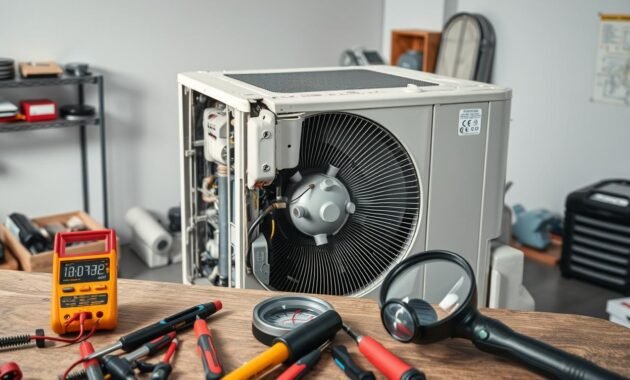
First, do a thorough check of your air conditioning unit. Always turn off the power at the circuit breaker before you start. This is for your safety.
- Inspect the outdoor unit for visible debris or damage
- Check fan blades for alignment and obstruction
- Listen carefully to pinpoint the source of the noise
- Examine air filters for excessive dirt buildup
For loud cooling system fixes, here are some quick steps:
- Remove any leaves, twigs, or debris around the outdoor unit
- Clean or replace the air filter if it appears dirty
- Gently clean fan blades using a soft brush
- Check for any loose mounting screws or components
| Noise Type | Potential Cause | Recommended Action |
|---|---|---|
| Rattling | Loose components | Tighten mounting screws |
| Squealing | Worn belt or fan motor | Inspect and lubricate or replace |
| Grinding | Compressor issues | Contact professional technician |
If these steps don’t fix the problem, it’s time to call a professional HVAC technician. Some issues need expert help to avoid more damage to your cooling system.
When to Power Down Your AC System
Knowing when to turn off your air conditioner is key to avoiding expensive repairs. Some ac noises are clear warnings that mean you should shut it down right away.
Not all ac noises are the same. Some are just minor issues, while others are serious problems. If ignored, these could cause your system to fail completely.
Read also: Causes of Air Conditioner Knocking Noise
Emergency Shutdown Scenarios
Turn off your air conditioner fast if you hear:
- Loud grinding or scraping sounds, which mean mechanical failure
- A burning electrical smell, which could be wiring problems
- It’s making airplane noise too loudly
- There’s a sudden big change in how it works
- You see smoke or sparks coming from it
Preventing Further Damage
When your air conditioner starts making loud noises, act fast to avoid big repair costs. Turning it off stops more damage and prevents it from breaking down completely.
Here’s what to do in an emergency shutdown:
- Turn off the thermostat
- Switch off the circuit breaker
- Disconnect power at the exterior unit
- Call a professional HVAC technician
Protecting your cooling system starts with noticing odd noises and acting quickly. Quick action can save you from a costly replacement.
Professional vs DIY AC Noise Solutions
Dealing with loud air conditioner repair can be tricky. Not every noise problem needs a pro, but some do. I’ve learned that knowing the difference can save you money and prevent damage to your HVAC system.
Some noise issues you can tackle yourself include:
- Cleaning air filters
- Removing debris from outdoor units
- Checking for loose components
- Lubricating fan motors
When it comes to hvac excessive noise, there are critical moments when you must call a professional. Certain sounds indicate serious problems that could lead to complete system failure if not addressed by a trained technician.
Signs you need professional loud air conditioner repair include:
- Grinding or metallic scraping sounds
- Persistent loud buzzing
- Sudden changes in system performance
- Electrical burning smells
DIY repairs might seem cost-effective, but they can quickly become expensive mistakes. An incorrectly repaired air conditioning system could result in thousands of dollars in damage. Professional HVAC technicians have specialized tools and diagnostic equipment to pinpoint and resolve complex noise issues safely.
My recommendation? When in doubt, contact a professional. They’ll ensure your system runs quietly and efficiently, protecting your investment and your comfort.
Prevention Tips for Quiet AC Operation
To keep your air conditioning system quiet, regular maintenance is key. This approach helps avoid costly repairs and annoying noises that can disturb your sleep.
Preventing air conditioner noise is more than just fixing issues. It’s about staying ahead of problems with regular upkeep. This way, you can avoid a noisy AC unit.
Creating a Maintenance Checklist
Your AC maintenance routine should include several critical steps:
- Clean or replace air filters every 1-3 months
- Clear debris from outdoor condensing unit
- Check refrigerant levels annually
- Lubricate moving parts to reduce friction
- Inspect electrical connections for wear
Component Inspection Guidelines
Experts suggest a thorough inspection at least once a year. During these check-ups, they will:
- Examine fan blades for balance and alignment
- Test compressor performance
- Clean condenser and evaporator coils
- Verify thermostat calibration
By taking care of your AC, you can cut down on noise and make it last longer. A well-kept air conditioner is both quiet and efficient.
Cost Implications of Ignoring AC Noise
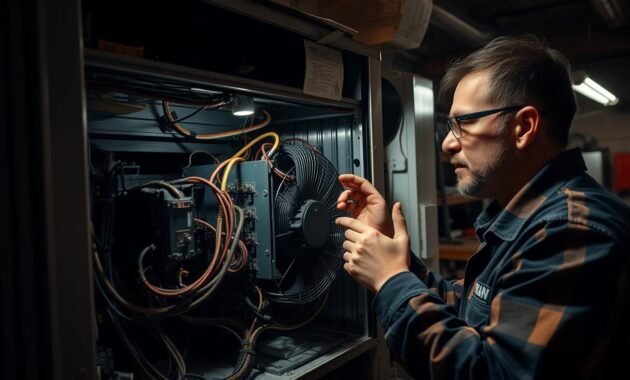
Ignoring loud air conditioner repair might seem like saving money. But, it can quickly turn into a big financial problem. Small issues can grow into expensive ones that cost a lot more than you think.
Here are the financial risks of ignoring AC sounds:
- Minor repairs can cost $100-$300
- Major component replacements range from $500-$2,000
- Complete system replacement: $3,000-$7,000
The real cost of ignoring AC noise is more than just repair costs. An inefficient system uses more electricity, raising your energy bills. A broken air conditioner can use 20-30% more energy, adding a lot to your bills over time.
| AC Issue | Potential Cost | Energy Impact |
|---|---|---|
| Loose Components | $150-$250 | 5-10% increase |
| Compressor Problems | $1,500-$2,500 | 25-35% increase |
| Complete System Failure | $4,000-$7,000 | 40-50% increase |
Regular maintenance can stop these expensive problems. By getting annual inspections and fixing loud air conditioner issues quickly, you can save thousands. Think of maintenance as an investment, not a waste of money.
Choosing Between AC Repair and Replacement
When your air conditioning system starts making loud noises, you face a big decision. Should you repair it or replace it? I’ve helped many homeowners make this choice, and it’s not always easy.
Several important factors help decide between repair or replacement. The age of your AC system is key. ACs over 10-15 years old often lose efficiency and make more noise.
- Systems under 10 years: Repair might be cost-effective
- Systems over 15 years: Replacement often makes more financial sense
- Frequent repair history: Consider replacement
Cost comparison is vital. I suggest adding up repair costs and compare them to a new unit’s price. New air conditioners are more energy-efficient, saving you money over time.
When looking at repair or replacement, consider these key points:
- Current system’s repair frequency
- Energy efficiency ratings
- Total repair costs versus replacement price
- Potential energy savings with a new unit
Getting advice from a professional HVAC technician is a good idea. They can give you advice based on your specific situation and cooling needs.
Conclusion
When your air conditioner sounds like a jet engine, you need to act fast. Unusual noises are not just annoying; they warn of system problems. Troubleshooting your AC isn’t just about quiet; it’s about keeping your home cool.
In this guide, I’ve shared tips on why air conditioners can get loud. Faulty compressors and dirty parts are common culprits. Knowing when a noise is minor or serious is key.
My advice is clear: don’t ignore strange sounds. Regular checks and quick fixes can save you money. If your AC is too loud, try simple fixes first. But if it doesn’t work, call a pro.
A well-kept AC should run quietly and efficiently. Stay on top of maintenance to keep your home cool and comfortable all summer.
